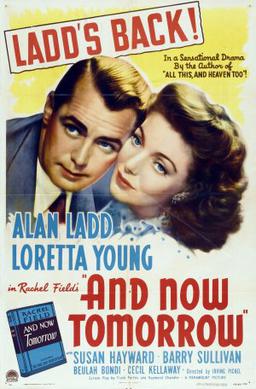And Now Tomorrow
And Now Tomorrow is a novel written by Rachel Field, first published in 1942. It tells the story of Emily Blair, a wealthy and beautiful woman who becomes deaf due to an illness. The novel explores themes of disability, love, and overcoming adversity. Emily's journey of self-discovery and her struggle to find a place in a world that often marginalizes those with disabilities form the core of the narrative. The story is set against the backdrop of a small American town in the early 20th century, providing a vivid portrayal of the era's social norms and values.
Plot Summary[edit | edit source]
Emily Blair is the envy of her small town, blessed with wealth, beauty, and a loving family. However, her perfect world shatters when she contracts an illness that leaves her deaf. Faced with this new reality, Emily struggles to adjust to her condition, feeling isolated from her community and the life she once knew. Her fiancé, Jeff Stoddard, finds it difficult to cope with Emily's deafness, causing tension in their relationship.
In her quest for a cure, Emily meets Dr. Merek Vance, a brilliant but cynical physician who has developed a potential treatment for her condition. Despite their initial differences, Emily and Dr. Vance form a deep connection as they work together to overcome her deafness. Through her interactions with Dr. Vance and the challenges she faces, Emily learns valuable lessons about resilience, empathy, and the true meaning of love.
Themes and Analysis[edit | edit source]
And Now Tomorrow delves into several significant themes, including the impact of disability on individuals and their relationships, the journey towards self-acceptance, and the transformative power of love. The novel also addresses societal attitudes towards disability, highlighting the prejudice and barriers faced by those with disabilities.
Rachel Field's portrayal of Emily's character offers a nuanced exploration of the psychological effects of sudden disability. Emily's journey from despair to empowerment reflects a broader narrative of overcoming adversity through inner strength and the support of others.
Reception[edit | edit source]
Upon its release, And Now Tomorrow received positive reviews for its sensitive treatment of disability and its compelling narrative. The novel was praised for its character development and the emotional depth of its story. It has since been recognized as an important work in the genre of disability literature.
Adaptations[edit | edit source]
The popularity of And Now Tomorrow led to its adaptation into a film in 1944, directed by Irving Pichel and starring Loretta Young and Alan Ladd. The film adaptation closely follows the plot of the novel, though with some modifications to fit the cinematic format.
Legacy[edit | edit source]
And Now Tomorrow remains a significant work for its early and empathetic portrayal of disability. It continues to be studied for its contributions to disability literature and its reflection of societal attitudes towards disability during the early 20th century.
Transform your life with W8MD's budget GLP1 injections from $125
W8MD offers a medical weight loss program NYC and a clinic to lose weight in Philadelphia. Our W8MD's physician supervised medical weight loss centers in NYC provides expert medical guidance, and offers telemedicine options for convenience.
Why choose W8MD?
- Comprehensive care with FDA-approved weight loss medications including:
- loss injections in NYC both generic and brand names:
- weight loss medications including Phentermine, Qsymia, Diethylpropion etc.
- Accept most insurances for visits or discounted self pay cost.
- Generic weight loss injections starting from just $125.00 for the starting dose
- In person weight loss NYC and telemedicine medical weight loss options in New York city available
- Budget GLP1 weight loss injections in NYC starting from $125.00 biweekly with insurance!
Book Your Appointment
Start your NYC weight loss journey today at our NYC medical weight loss, and Philadelphia medical weight loss Call (718)946-5500 for NY and 215 676 2334 for PA
Search WikiMD
Ad.Tired of being Overweight? Try W8MD's NYC physician weight loss.
Semaglutide (Ozempic / Wegovy and Tirzepatide (Mounjaro / Zepbound) available. Call 718 946 5500.
Advertise on WikiMD
|
WikiMD's Wellness Encyclopedia |
| Let Food Be Thy Medicine Medicine Thy Food - Hippocrates |
Translate this page: - East Asian
中文,
日本,
한국어,
South Asian
हिन्दी,
தமிழ்,
తెలుగు,
Urdu,
ಕನ್ನಡ,
Southeast Asian
Indonesian,
Vietnamese,
Thai,
မြန်မာဘာသာ,
বাংলা
European
español,
Deutsch,
français,
Greek,
português do Brasil,
polski,
română,
русский,
Nederlands,
norsk,
svenska,
suomi,
Italian
Middle Eastern & African
عربى,
Turkish,
Persian,
Hebrew,
Afrikaans,
isiZulu,
Kiswahili,
Other
Bulgarian,
Hungarian,
Czech,
Swedish,
മലയാളം,
मराठी,
ਪੰਜਾਬੀ,
ગુજરાતી,
Portuguese,
Ukrainian
Medical Disclaimer: WikiMD is not a substitute for professional medical advice. The information on WikiMD is provided as an information resource only, may be incorrect, outdated or misleading, and is not to be used or relied on for any diagnostic or treatment purposes. Please consult your health care provider before making any healthcare decisions or for guidance about a specific medical condition. WikiMD expressly disclaims responsibility, and shall have no liability, for any damages, loss, injury, or liability whatsoever suffered as a result of your reliance on the information contained in this site. By visiting this site you agree to the foregoing terms and conditions, which may from time to time be changed or supplemented by WikiMD. If you do not agree to the foregoing terms and conditions, you should not enter or use this site. See full disclaimer.
Credits:Most images are courtesy of Wikimedia commons, and templates, categories Wikipedia, licensed under CC BY SA or similar.
Contributors: Prab R. Tumpati, MD



